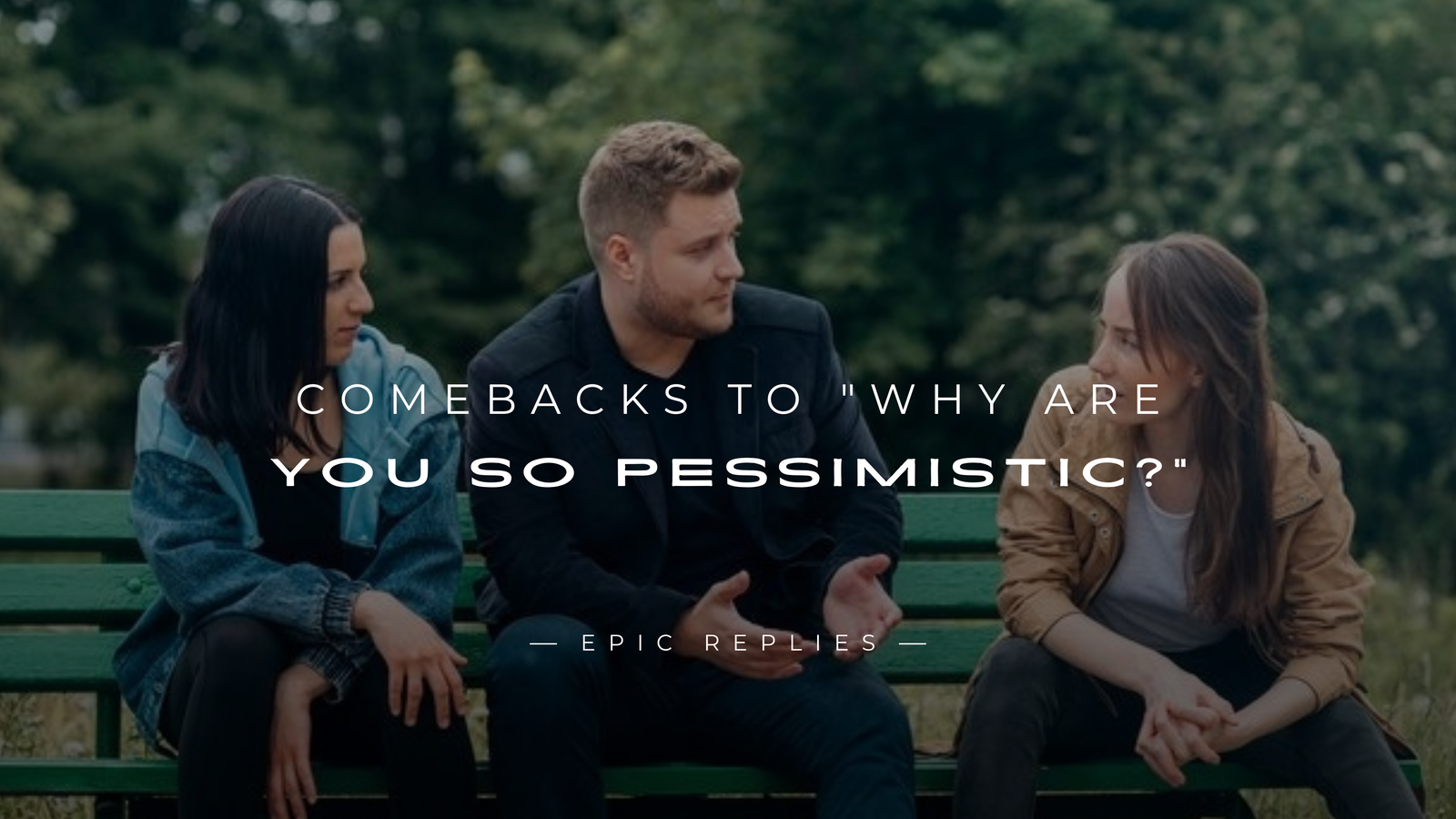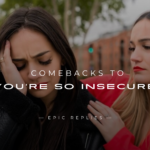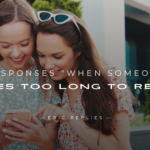At some point, you have probably heard someone ask, “Why are you so pessimistic?” Maybe it came from a friend after you pointed out a possible downside, or a coworker when you raised concerns about a project. That question can feel like a punch in the gut. It can make you feel judged, defensive, or misunderstood. The implication is that you are negative or difficult, even if your intentions were just to be realistic or prepared.
The truth is, people often confuse realism with pessimism. Some individuals are naturally more cautious, analytical, or aware of potential risks. That doesn’t mean you lack optimism or hope. It means you process information differently. When someone hits you with the question “Why are you so pessimistic?”, how you respond can either turn the conversation into a power struggle or an opportunity to show confidence, humor, and emotional intelligence.

250+ Comebacks to “Why Are You So Pessimistic?”
Sarcastic Comebacks
- Oh, sorry, I didn’t realize sunshine was mandatory today.
- Because reality just loves to prove me wrong in the worst way.
- I tried optimism once. The results were… disappointing.
- I’m just trying to fit the vibe of the world.
- If being realistic is a crime, call me guilty.
- I’m not pessimistic, I’m just allergic to false hope.
- I prefer to get my disappointments out of the way early.
- Guess I missed the memo about pretending everything’s fine.
- Because every time I’m positive, the universe laughs.
- I’m just saving everyone time by skipping the “it’ll be fine” phase.
Funny Comebacks
- I’m not pessimistic, I’m just pre-sad for convenience.
- Because if I expect the worst, I’m never disappointed, just prepared.
- I call it emotional budgeting.
- My optimism went out for milk years ago and never came back.
- I’m just realistic with style.
- Hey, someone has to prepare for the apocalypse.
- It’s my hobby some people knit, I doubt.
- I’m training for life’s unexpected plot twists.
- Because rainbows don’t pay rent.
- I’m not negative, I’m just pro-reality.
Philosophical Comebacks
- What you call pessimism, I call wisdom earned through disappointment.
- Expecting the worst is simply acknowledging entropy.
- Pessimism is just realism without denial.
- Hope is a fragile thing; I choose preparation instead.
- The optimist sees light, but the realist brings a flashlight.
- Life is uncertain, and I simply respect that truth.
- Pessimism is the art of survival in disguise.
- I’ve learned that balance requires both doubt and belief.
- I observe, therefore I expect less.
- It’s not pessimism, it’s a philosophical insurance policy.
Savage Comebacks
- Because someone around here needs to see reality clearly.
- I tried optimism then I met people.
- Pessimism keeps me from being surprised by mediocrity.
- At least I don’t live in denial like some folks.
- I’d rather be a realist than a dreamer waiting to crash.
- Because fairytales are for people without bills.
- Optimism is cute until life hits you with a brick.
- I call it mental armor, not pessimism.
- Maybe if you faced reality, you’d get it too.
- Because I’ve seen too much nonsense to fake enthusiasm.
Cynical Comebacks
- Experience has shown me that optimism expires fast.
- People disappoint me before breakfast.
- Every silver lining has a dark cloud waiting nearby.
- I just expect people to be people it saves time.
- Hope is great until it runs out of batteries.
- Life’s a joke, I just stopped laughing.
- I’d rather expect the worst than fall for false smiles.
- The world taught me this attitude for free.
- I’m not bitter, I’m just accurately informed.
- Pessimism is the safest investment there is.
Defensive but Honest Comebacks
- I’ve just learned not to get my hopes too high anymore.
- It’s easier to handle life when you stop expecting miracles.
- I’m not trying to be negative, I’m just protecting myself.
- When you’ve been let down enough, you learn to expect less.
- I’d rather prepare for the worst than get blindsided.
- I don’t mean to sound gloomy, I’ve just seen patterns repeat.
- I’m not pessimistic, I’m cautious. There’s a difference.
- I’ve learned that hope needs boundaries.
- It’s not about negativity, it’s about survival.
- You call it pessimism; I call it emotional self-defense.
Melancholic Comebacks
- When you’ve been through enough storms, you stop waiting for sunshine.
- I used to be hopeful. Then life started teaching lessons.
- It’s not that I want to be pessimistic; it just feels safer.
- Sometimes expecting the worst is the only way to stay calm.
- Hope faded, but the memories didn’t.
- I don’t mean to sound negative; I’m just tired.
- It’s hard to believe in bright sides when the past still hurts.
- I stopped chasing silver linings they always move.
- I’m just trying to make peace with disappointment.
- I guess I learned that not everything gets better.
Playfully Innocent Comebacks
- Pessimistic? No, I’m just pre-disappointed. It saves time!
- I’m not gloomy; I’m just being creatively cautious.
- I’m simply managing expectations like a responsible adult.
- It’s not pessimism it’s advanced realism!
- I’m like an optimist, but with insurance.
- I’m just preparing for the worst-case scenario… for fun!
- My glass isn’t half empty; it’s just waiting for a refill.
- I like to call it “hope with a helmet.”
- I’m not negative, I’m just saving my excitement for later.
- I’m just emotionally organized.
Witty Comebacks
- I’m not pessimistic, I just have a very exclusive friendship with reality.
- My optimism’s on vacation, and pessimism’s covering the shift.
- It’s not negativity, it’s just premium-grade skepticism.
- I like to call it “foresight with flair.”
- I’m not expecting the worst; I’m just mentally rehearsing for it.
- Pessimism keeps me humble and occasionally correct.
- I don’t see the glass half empty, I see it leaking.
- I’d rather be pleasantly surprised than rudely awakened.
- Being realistic is my superpower.
- I’m just keeping my expectations socially distanced from disappointment.
Intellectual Comebacks
- Statistically speaking, pessimists are right more often.
- I’m simply applying probability theory to life outcomes.
- It’s a logical stance against statistical disappointment.
- I’ve conducted enough experiments to know hope is unstable.
- The data supports my attitude, unfortunately.
- I call it evidence-based emotional management.
- My realism is an empirical conclusion, not a mood.
- I trust patterns, not promises.
- The human condition itself demands a cautious outlook.
- I’m not pessimistic, I’m just a critical thinker in an unpredictable world.
Confident Comebacks
- Because I see things clearly, not through rose-colored filters.
- I’d rather prepare than pretend.
- I don’t need blind optimism to stay motivated.
- I’ve seen too much to underestimate reality.
- My mindset keeps me ahead of the surprises.
- I’m not negative, I’m strategic.
- Knowing what could go wrong helps me make it right.
- I’m confident enough to expect less and still win.
- Pessimism is just my version of preparation.
- I don’t fear the worst; I plan for it.
Blunt Comebacks
- Because life isn’t exactly handing out happy endings.
- Have you looked around lately?
- I call it how I see it.
- Reality doesn’t sugarcoat, so why should I?
- I’d be more optimistic if things stopped proving me right.
- I’m not being negative, just honest.
- I’ve met reality, and it’s not that cheerful.
- I say what everyone else is thinking but won’t admit.
- If truth sounds pessimistic, that’s not my fault.
- I don’t do delusion.
Dramatic Comebacks
- Because life is a tragic comedy and I’m just reading my lines.
- I’ve stared into the abyss and it waved back.
- Hope and I broke up a long time ago.
- I used to chase the light, but the shadows caught up.
- Every optimist was once a pessimist in training.
- Reality loves to turn plot twists into cliffhangers.
- I’m just the narrator of my own emotional downfall.
- I tried believing in miracles. They ghosted me.
- My optimism drowned in the pool of experience.
- I speak in realism because dreams betrayed me.
Optimistic Twist Comebacks
- I’m not pessimistic, I just like being pleasantly surprised.
- Expecting the worst means everything else feels better.
- I’d rather be shocked by good news than crushed by bad.
- My low expectations make every win a miracle.
- It’s not negativity, it’s creative optimism.
- Pessimism is just optimism with a safety net.
- I’m preparing for storms so I can enjoy the sunshine more.
- I call it realistic hope.
- I stay grounded so I can appreciate the lift when it happens.
- I may sound pessimistic, but deep down I’m just tired of false hope.
Mystical Comebacks
- The stars warned me about disappointment.
- The universe told me to lower my expectations.
- My tarot cards keep saying “brace yourself.”
- Mercury’s been in retrograde for my entire life.
- I vibe with caution it’s my spiritual shield.
- The energy feels off, I’m just aligning with it.
- My intuition prefers to play defense.
- The cosmos and I agreed to stop pretending everything’s fine.
- I trust my vibes, and they’re rarely wrong.
- My aura’s just allergic to false positivity.
World-Weary Comebacks
- You get this way after enough disappointments.
- I’ve seen too much to believe everything will work out.
- Experience tends to sand off the optimism.
- Life teaches hard lessons if you’re paying attention.
- It’s not pessimism, it’s experience talking.
- After enough storms, you stop expecting sunshine.
- I’ve learned that hope has a short shelf life.
- The longer you live, the fewer surprises you want.
- I’m just a product of my battle scars.
- I’ve walked through too many endings to trust beginnings.
Relatable Humor Comebacks
- Because I’ve seen what happens when I’m optimistic it backfires.
- I’m just managing my emotional budget responsibly.
- My optimism got lost in traffic years ago.
- I’m not pessimistic, I’m just tired of plot twists.
- It’s not negativity, it’s experience with Wi-Fi.
- I’ve met customer service, that’s why.
- I like to keep my expectations as low as my phone battery.
- I tried positivity, but it ghosted me after three days.
- I’m just pre-disappointed to save time later.
- I’m not negative, I’m just emotionally seasoned.
Self-Deprecating Comebacks
- It’s my brand at this point, might as well own it.
- I’d be more optimistic, but I can barely handle my own expectations.
- If there was a trophy for low expectations, I’d still probably lose it.
- I tried optimism once, but it didn’t like me back.
- I’m just trying to match my inner chaos with my outer mood.
- Pessimism is my comfort zone; at least I know what to expect.
- My positivity ran away and left a note that said “good luck.”
- I don’t expect much from life, and life kindly meets that standard.
- If disappointment were a sport, I’d be a world champion.
- I’m not pessimistic, I’m just managing my lifelong streak of bad timing.
Mirror Comebacks (Reflecting It Back)
- Maybe I just notice things you choose to ignore.
- Why are you so optimistic about everything?
- I’m just reacting to the same world you’re living in.
- Maybe I’m not pessimistic, maybe you’re just overly hopeful.
- You see sunshine, I see reality; same sky, different view.
- I guess I balance your optimism so the universe doesn’t implode.
- Perhaps I’m the realist and you’re the dreamer.
- I call it perspective, you call it pessimism.
- Maybe your positivity just can’t handle my honesty.
- I think we’re just looking at the same glass from different sides.
Cool & Detached Comebacks
- It’s not pessimism, it’s peace with the inevitable.
- I’ve stopped getting worked up over what I can’t change.
- I don’t expect much, so life can’t really surprise me.
- I call it emotional efficiency.
- I just prefer to stay neutral; feelings are overrated.
- Being calm and cautious saves me energy.
- I’m not pessimistic, I’m just unbothered by illusions.
- I don’t stress about outcomes that are already written.
- It’s easier to float through life when you expect less turbulence.
- I’m not negative, I’m just emotionally minimalist.
Bold Comebacks
- Because pretending everything’s great doesn’t fix anything.
- I’d rather be real than blindly hopeful.
- I don’t sugarcoat reality, I bite into it.
- My pessimism keeps me ready for whatever’s next.
- I speak truth, not fairytales.
- Optimism without logic is just denial.
- I’m not scared of being called negative, I’m scared of being naïve.
- Facing the dark side makes me stronger.
- I’m just brave enough to admit things aren’t perfect.
- I’d rather sound harsh than live blind.
Life Experience Comebacks
- You get this way after life humbles you a few times.
- I’ve learned the hard way that hope comes with fine print.
- Every scar teaches a little more realism.
- I’ve been through enough to stop expecting smooth roads.
- Experience is the best teacher, but it grades harshly.
- I used to be optimistic before life started writing plot twists.
- When you’ve fallen enough times, you start walking slower.
- It’s not pessimism, it’s memory with context.
- I’ve just learned that not everything good lasts forever.
- I’m not bitter, just educated by reality.
Wise Comebacks
- Expecting less makes gratitude easier.
- Balance comes from seeing both the light and the shadow.
- Hope without preparation is just wishful thinking.
- Caution is not fear; it’s wisdom earned through time.
- I’ve learned that realism protects peace.
- The world doesn’t owe us sunshine, but it still gives light sometimes.
- Sometimes expecting less helps you appreciate more.
- I don’t chase positivity; I build stability.
- The wise prepare, the naive assume.
- I’ve just learned that grounded hope is the only kind that lasts.
Dark Humor Comebacks
- Because happiness is expensive and irony is free.
- I’m just mentally preparing for my next disaster.
- Hope died, but I kept the funeral short.
- I don’t see the glass half empty; I see it about to shatter.
- My optimism was last seen in 2008 missing, presumed dead.
- I smile through the apocalypse, that counts for something.
- I’m just trying to stay one joke ahead of my bad luck.
- Pessimism makes life’s tragedies feel like inside jokes.
- I treat disappointment like cardio it keeps my heart active.
- I’m not negative, I’m just laughing at the inevitable.
Polite but Cutting Comebacks
- I appreciate your concern, but I prefer realistic expectations.
- It’s not that I’m pessimistic; I just don’t overlook details.
- Some of us cope differently, that’s all.
- I’m simply more cautious about where I place my hope.
- I’d love to be more positive, but experience disagrees.
- I admire your optimism, even if it’s a little naïve.
- That’s sweet of you to notice; I prefer preparation over surprise.
- I just prefer to stay grounded while others float.
- I’m not negative, I’m just less easily impressed.
- Thank you for the feedback, I’ll be sure to stay realistically pessimistic.
Understanding What “Why Are You So Pessimistic?” Really Means
The phrase “Why are you so pessimistic?” might sound simple, but it can carry many meanings depending on tone, timing, and relationship. To answer effectively, you need to understand what the person is really saying.
- Sometimes It’s Genuine Curiosity
In some cases, the person isn’t attacking you. They may actually be curious about your thought process. Maybe they see the world differently and want to understand why you tend to expect the worst or focus on possible problems.
- Sometimes It’s Judgmental or Dismissive
Other times, it’s a subtle way of invalidating your feelings. When someone says it with irritation or sarcasm, what they really mean is, “Stop being so negative. You’re making me uncomfortable.” In this case, you are not the problem; their discomfort is.
- Sometimes It’s Projection
People who cannot handle uncertainty or negativity often project that discomfort onto others. If someone calls you pessimistic often, they may be struggling with their own inability to face difficult truths. Recognizing this helps you stay calm instead of taking it personally.
The Psychology Behind Pessimism and Optimism
Pessimism is not simply “negativity.” It’s a cognitive style that emphasizes caution, preparation, and anticipation of potential risks. Optimism focuses on positive possibilities and hopeful outcomes. Both have their strengths. The best communicators balance the two.
Research shows that pessimistic thinkers tend to be more detail-oriented and prepared, while optimists are better at maintaining motivation and reducing stress. When someone calls you pessimistic, it might actually mean you are realistic and responsible.
How to Decide Your Response Style
Not every situation calls for the same comeback. The best response depends on who is asking, how they ask, and what you want to achieve.
- Humorous Style
Ideal when the situation is casual or lighthearted. Humor reduces tension and shows confidence.
- Assertive Style
Useful when you need to set a boundary and make it clear that labeling you isn’t acceptable.
- Reflective Style
Perfect for turning a potentially negative exchange into a deeper conversation.
- Educational Style
Best used in professional or analytical settings where logic matters more than emotion.
- Empathetic Style
Good when you want to preserve relationships while still standing your ground.
- Deflective Style
Use this when you want to move the topic away smoothly without confrontation.
30 Detailed Comebacks to “Why Are You So Pessimistic?”
Here are different types of responses you can use depending on the tone and context.
Humorous Comebacks
- “I’m not pessimistic, I’m just a professional realist.”
- “Think of me as the safety net in a world full of tightrope walkers.”
- “Pessimistic? No, I’m just allergic to disappointment.”
- “Someone has to check if the glass is even clean before saying it’s half full.”
- “I’m not pessimistic. I’m just on a first-name basis with reality.”
- “Call me cautious, not catastrophic.”
Assertive Comebacks
- “That’s your opinion. I see it as being careful.”
- “I prefer realistic planning over wishful thinking.”
- “I’d appreciate it if we focused on ideas instead of labels.”
- “I’m not pessimistic, I’m just analyzing all possible outcomes.”
- “If looking at both sides makes me pessimistic, I’m fine with that.”
- “I don’t identify with that label. Let’s discuss the actual issue.”
Reflective Comebacks
- “Why do you see my point of view as pessimistic?”
- “Interesting thought. What would optimism sound like to you here?”
- “Do you think I’m being unfair, or just cautious?”
- “Is it pessimism, or am I just noticing risks others prefer to ignore?”
- “I’m curious, what makes you define it that way?”
- “Could it be that I’m just more aware of what could go wrong?”
Empathetic Comebacks
- “I know it can sound negative. I just like to be prepared for surprises.”
- “I understand how it might come off that way. I just process things differently.”
- “I appreciate your optimism. It helps balance my realism.”
- “That’s fair. I do tend to look for flaws so I can fix them early.”
- “It’s not that I expect bad things; I just want to be ready if they happen.”
- “Thanks for noticing. I’m working on finding the balance between realistic and hopeful.”
Deflective or Boundary-Setting Comebacks
- “That’s one way to see it. Let’s get back to the main point.”
- “Maybe, but it works for me. What’s next?”
- “Labels don’t help much. Let’s solve the problem instead.”
- “I’d rather be realistic than surprised.”
- “Let’s agree to see things differently.”
- “You can call it pessimism. I call it preparation.”
Tailoring Your Comeback to Different Environments
- In the Workplace
At work, your goal is to stay professional and composed. If someone says, “Why are you so pessimistic?”, respond with logic. For example:
“I’m identifying potential issues early so we can plan better. That’s part of risk management.”
This not only defends your viewpoint but also shows leadership.
- With Family and Friends
Here, your tone can be softer. You can say, “I know I sound cautious. It’s just how I manage uncertainty.” This shows emotional honesty while maintaining self-respect.
- In Romantic Relationships
If your partner says, “Why are you so pessimistic?”, you can reply warmly: “I’ve had experiences that make me think ahead, but I promise I’m not hopeless.” This encourages emotional connection instead of tension.
- On Social Media
Public comments can get messy. A smart reply might be, “Different perspectives make discussions richer. This is mine.” Short, polite, and confident.
Tone, Body Language, and Delivery Matter
Even the best comeback can fail if your tone or body language sends mixed signals.
- Pause Before Responding
A brief pause before replying shows composure. It prevents defensive reactions and gives you control.
- Use a Calm, Steady Voice
Speak slowly and clearly. A calm tone communicates authority better than loudness.
- Body Language Speaks First
Maintain eye contact, keep your posture open, and avoid nervous gestures like fidgeting. Your body should express confidence even before your words do.
When Not to Respond With a Comeback
Sometimes, silence is your best response. If the person seems angry, manipulative, or abusive, you don’t owe them a clever line. Simply say, “I’m not discussing this right now.” Your peace matters more than your wit.
How to Turn the Moment Into Growth
If you often hear, “Why are you so pessimistic?”, it might be worth reflecting. Ask yourself:
- Do I focus too much on what could go wrong?
- Can I express caution in a more constructive way?
- Am I surrounding myself with overly dismissive people?
Self-awareness helps you communicate more effectively without changing your core personality.
Using Humor Without Undermining Yourself
Humor is a double-edged sword. When used right, it breaks tension and shows charm. But self-deprecating humor can weaken your credibility. Instead of saying, “Yeah, I’m just a downer,” try “I guess I’m the designated realist in the group.” It keeps things light without putting yourself down.
Common Mistakes to Avoid in Comebacks
- Don’t overexplain yourself. It makes you sound defensive.
- Don’t mirror rudeness. Stay calm and composed.
- Don’t apologize for your thinking style.
- Avoid sarcasm that might sound bitter.
- Don’t escalate the conversation into conflict.
Examples of Effective Real-Life Scenarios
- At Work
Coworker: “Why are you so pessimistic about this idea?”
You: “I’m just analyzing the risks so we can be fully prepared. Once that’s handled, I’ll be just as excited as you.” - At a Family Gathering
Relative: “Why are you so pessimistic all the time?”
You: “I like to think ahead. It’s how I keep things stable. I promise I still enjoy life.” - On a Date
Date: “Why are you so pessimistic about relationships?”
You: “Maybe I’ve just learned to value caution. But I’m open to good surprises.”
When Pessimism Becomes Persistent
If pessimism becomes overwhelming or constant, it might indicate underlying stress or depression. There’s nothing wrong with seeking help. Talking to a therapist can help you understand where your outlook comes from and how to balance realism with optimism. You deserve to feel hopeful and secure at the same time.
Key Takeaways to Handle “Why Are You So Pessimistic?”
- Understand the intent before reacting.
- Choose a response style that fits the situation.
- Keep your words short, clear, and confident.
- Use humor or empathy when appropriate.
- Remember, being realistic is not a flaw.
Conclusion
At the end of the day, being called pessimistic doesn’t mean you lack positivity it often means you see reality with clear eyes and sharp wit. With these 250+ comebacks, you’ll never run out of clever ways to flip the script and keep conversations light, confident, and funny. Whether you’re sparking laughter or shutting down unnecessary comments, these replies remind everyone that quick thinking is its own kind of optimism.
If you enjoyed these snappy retorts, don’t miss our other post 250+ Best Comebacks to “You’re Always So Confused” for even more hilarious and relatable responses.
FAQs
Q. What is a smart response to “Why are you so pessimistic?”
A1. A great answer is, “I’m realistic, not pessimistic. I just like to prepare for all outcomes.” It sounds confident and rational.
Q. How can I sound less defensive when replying?
A2. Use curiosity instead of aggression. Ask, “What makes you say that?” It keeps the tone open and reflective.
Q. Is humor a good way to respond?
A3. Yes, humor works well if it’s gentle and self-aware. Avoid sarcasm that sounds bitter or dismissive.
Q. How can I balance realism and optimism?
A4. Focus on identifying problems but also propose solutions. That balance turns you from a “pessimist” into a “problem solver.”
Q. What if I really am pessimistic and want to change?
A5. Practice gratitude, challenge negative thoughts, and surround yourself with positive influences. If it feels persistent, consider speaking with a counselor to find balance.










